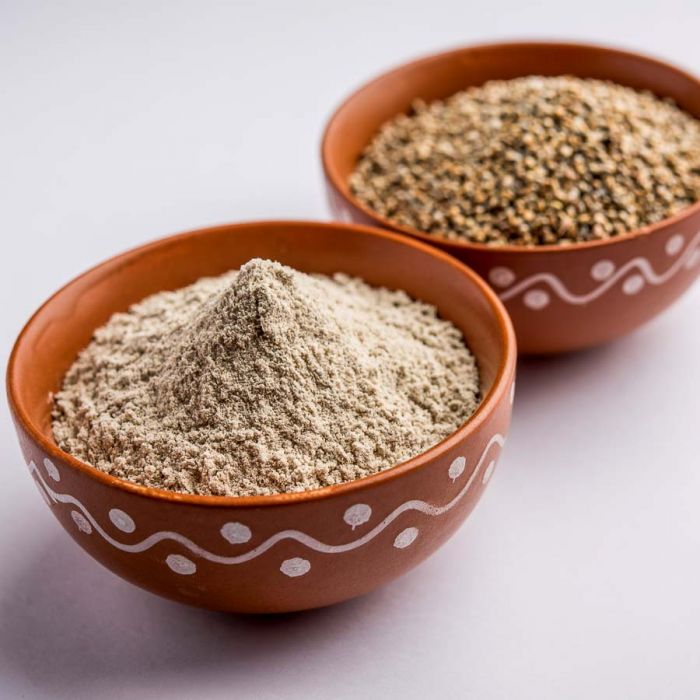From Grains to Glory: Exploring the flours of India and its Benefits

Diverse culture brings diverse taste and diverse variety in food. India’s rich culinary heritage is closely tied to its diverse range of flours, each derived from various grains, pulses, and seeds. These flours form the backbone of a multitude of traditional dishes, capturing the essence of regional flavors and cultures. India is a place where you get unique dishes and variety of taste, every region has their own taste of food. Combination of sabji , dal with different types of chappati/ roti/ bakhri is where India stand separate from others and hold a solo position for having such a huge range of diverse varieties. Millets are the origin of India and also the staple food. Combining makki roti with sarson saag, bajra roti with kadi, jowar bakhri with pithla, ragi with any gravy sabji, akki roti with chutney, this has been going on for years. Eating different flour plays a significant role on our health. Here are the list of flours, let’s see their role on our day to day life
1) Bajra / Pearl millet Flour:
Pearl Millet is famous world wide and grown in various parts of India and African countries. In India, Pearl millets is known as Bajra in Hindi, Bajri in Gujrati, Kambu in Tamil, Sajjalu in Telugu. This is a winter millet, available and consumed preferably in this season. As bajra has heat(pitta), always combine it with ghee or milk or curd to subside its side effects. Pearl Millet has very high nutritional value and gluten free millet.
- Rich in protein.
- Helps in weight loss
- Good for people who have celiac disease (intolerant to gluten).
- Preferred grain by the diabetic people.
- It regulates menstrual cycle and helps in curing the problem related to PCOS.
2) Makki/ maize/ corn flour:
Maize as a cereal known for its energy giving properties. It is largely grown in America, India, Argentina, Mexico. In India, it is known as Makki/ Makai and mainly consumed in the winter season. Maize should always be combined with ghee, milk, curd to reduce its heat(pitta) properties.
- Good source of vitamin C.
- Miaze helps in curing Anemia and improves the iron level in your body.
- It is an energy giving cereal.
- Corn is very good for eye health
- Very beneficial for blood pressure patients , also controls cholesterol.
- It is completely gluten free and can be a staple food for gluten allergic patients.
3) Jowar / Sorghum flour:
It is a fact that not every cereal fits to every person. If you are that person who cannot digest few gluten-free cereal grains like Maize or Bajra then Jowar/Sorghum is for you. It can be consumed in all the seasons and easy to digest grain. Jowar flour is very rich in fibers and helps in curing the problem of constipation and IBS.
- Used for controlling weight as it is gluten free.
- Good source of iron and protein.
- Helps in improving bone health.
- It has anti cancer agents and keeps the cancer disease away from you.
- Jowar is beneficial for improving hair growth.
4) Jau/ Barley flour:
Jau ki roti/ Bakri or Jau ka pani/ Jau ka Sattu are famous for its various nutritional values, can be consumed in any above form. This is all season millet and can be consumed throughout the year. Barley has cooling properties and used to curb pitta produced inside the body.
- Rich in anti oxidants.
- Barley is again full of fibers helps the one who suffers from indigestion issues.
- It controls the blood sugar level of the body
- Keeps the check on your cholesterol.
5) Ragi/ Nachni/Finger millet flour:
Finger Millet is called as super food because of its health benefits. Ragi lost its popularity in various regions of India, as it takes time in cooking and taste is also not accepted by everyone. But after knowing its various nutritional contents and a remedy for many diseases it recently gained the popularity again.
- Ragi is a good source of calcium, helps in improving bone density.
- Prolonged use of ragi flour helps in curing anemia.
- Rich in fibers and proteins.
6) Chawal/ Rice flour:
- Easy to digest and recommended for those who have digestive issues.
- Completely gluten free, safe for celiac disease person
7) Amarnath/ Rajgira/ Ramdana flour
- Good source of iron and helps in improving iron deficiency.
- It has anti-inflammatory properties.
- Valuable amount of fibers which helps in controlling weight.
- Plant based flour can be used in fasting.
8) Kuttu/ Buckwheat flour
- Relieves from bloating and indigestion issues
- Good source of fibers so helps in increasing metabolic activities in the digestive system.
- Helps in losing weight.
- Plant based flour ideal for fasting meal
9) Wheat flour/ Gehun ka atta
- Rich source of protein.
- Helps in improving the health of hair and skin.
- commonly available flour at home.
- It has gluten in it. Need to be avoided by gluten allergic people.
